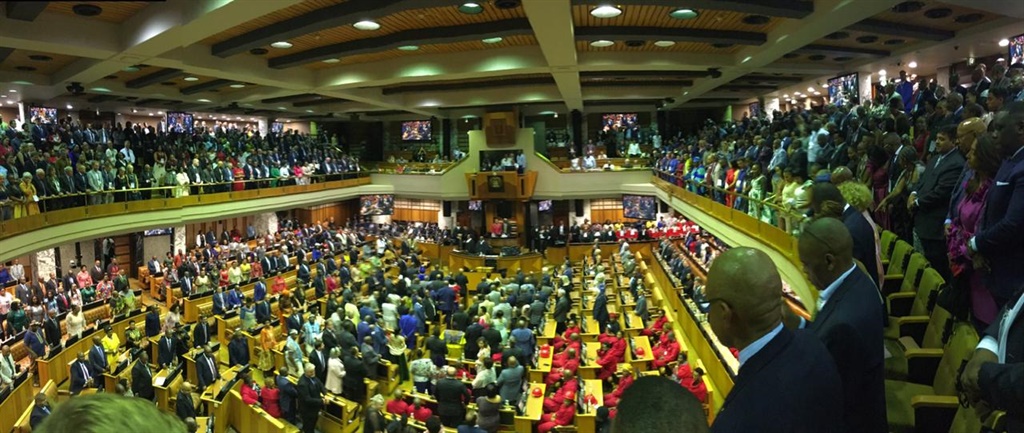


The National Assembly at Parliament.
Members of the National Assembly are, in effect, captives of their party bosses. They have to toe the party line. If they don’t, that is the end of their careers – and they will not make the list for the next election.
The decade of state capture highlighted the inadequacy of the present electoral system. Viewed through the prism of the chosen model of constitutional democracy, the present system, based as it is exclusively on proportional representation, whereby members of the National Assembly (NA) are elected by being on a list of candidates put up by their party.
Depending on the party’s success at the polls, a proportionate number of the party list make it to the NA. The majority party then nominates its leader to be president.
The members of the NA are, in effect, captives of the party bosses; toe the party line or that is the end of your career as you will not make the list for the next election. In this manner, the doctrine of separation of powers between the legislature and the executive is honoured almost exclusively in the breach. For years, ANC MPs slavishly supported Jacob Zuma and his minions, turning a blind eye to egregious levels of maladministration and corruption.
Billions of rand, which could and should have transformed the lives of millions, were stolen or wasted or both. Not a jot of action was taken by the legislature until Zuma was on the weakest of political legs. Similarly, Zuma was assured of elevation to president, even though his personal popularity was worse than the fascist in the White House – because as long as the ANC enjoyed majority support, the lack of esteem with which the country held Zuma was irrelevant to his holding on to the presidency.
It is because of this original constitutional sin that the judgment of the Constitutional Court in New Nation Movement NPC and Others v President of the Republic of South Africa and Others is so important. The majority of the Constitutional Court, by way of a judgment penned by Justice Mbuyiseli Madlanga, held that key provisions of the Electoral Act were unconstitutional to the extent that the Act requires that adult citizens be elected to the National Assembly and Provincial Legislatures only through their membership of political parties. In reaching this conclusion, the judge held that, despite having been pleaded as being discrete, the freedom of association challenge is inextricably linked to the content of the Section 19(3)) right, that is: every adult citizen has the right:
(a) to vote in elections for any legislative body established in terms of the Constitution, and to do so in secret; and
(b) to stand for public office and, if elected, to hold office.
In particular, the applicants argued that, given the constitutional protection of freedom of association, no one should be coerced so that they may not be able, in particular to exercise their Section 19(3)(b) right. Accordingly, in order to avoid a conflict between two rights, Justice Madlanga held that the court should prefer an interpretation of Section 19(3)(b) that promotes freedom of association.
As Justice Madlanga wrote: “The sections that are the source of freedom of association and rights that are cognate to it, namely freedom of conscience and the right to dignity, on the one hand, and the Section 19(3)(b) right, on the other, can be read harmoniously. The respondents’ reading of Section 19(3)(b) forces us to read in that one must stand for and hold political office “through a political party”. With the potential infringement of the Section 18 right and the correlative rights, that reading-in is contraindicated. This calls for a reading of Section 19(3)(b) that is consonant with Section 18 and the other related rights.”
The respondents in this case referenced Schedule 6 of the Constitution, which provides for a national and regional list as the basis of the constitutional scheme to support the present Act.
But, said Justice Madlanga, “although the interim Constitution and the Constitution already had in place a system of electing political office bearers in accordance with party lists – our constitutional order kept that system alive only up to the first election under the Constitution. Why was that system not kept in place indefinitely? It ought not to have been part of transitional arrangements under the Constitution. It ought to have been retained so that – instead of being required to create an electoral system – all that the Legislature would be left to do would be to provide nuts and bolts on how that existing system would work.”
The sharp point here is that the electoral system that was set out in Schedule 6 of the Constitution and, in terms of which elections have been conducted since the dawn of South African democracy, was only meant for the first elections. It could not be regarded as a basis for future elections based on this form of proportional representation, the very system which was the subject of this appeal.
The significance of this judgment cannot be overstated. It holds the possibility of a different, more direct system of elections in which members of the NA are elected in a manner in which they are more directly accountable to the electorate. That holds important implications for improved national and provincial governance.
As Justice Madlanga noted: “If all members of the National Assembly were free to vote as they pleased regardless of how politically sensitive an issue might be and, without any risk of reprisals from their political parties, litigation on this issue would not have been necessary. It is exactly because the opposite prevails that the litigation was instituted.”
This case is thus groundbreaking. It may produce the kind of electoral reform that brings democracy to the people by way of a system of substantially enhanced accountability of public representatives to the public they serve.

